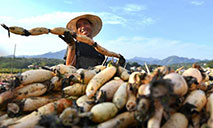World Bank sees setback in East Asia and Pacific's recovery amid surging Delta variant
WASHINGTON, Sept. 27 (Xinhua) -- The East Asia and Pacific region's recovery has been undermined by the spread of the COVID-19 Delta variant, the World Bank said Monday, calling for a comprehensive strategy to contain COVID-19 and boost inclusive growth.
Economic activity began to slow down in the second quarter of 2021, and growth forecasts have been downgraded for most countries in the region, according to World Bank's newly released East Asia and Pacific Fall 2021 Economic Update.
"Whereas in 2020 the region contained COVID-19 while other regions of the world struggled, the rise in COVID-19 cases in 2021 has decreased growth prospects for 2021," said World Bank Vice President for East Asia and Pacific Manuela Ferro.
While China's economy is projected to expand by 8.5 percent, up 0.4 percentage point from April projection, the rest of the region is forecast to grow at 2.5 percent, 1.9 percentage points less than forecast in April, the report showed.
Noting that there is variation across countries, Aaditya Mattoo, chief economist for East Asia and the Pacific at the World Bank, told Xinhua in a remote interview on Monday that some countries like China have been relatively successful in at least keeping this virus at bay, but other countries which had done well previously, especially like Vietnam and Malaysia, are now struggling to contain it and are suffering a "significant" contraction in economic activity.
Others like the Philippines and Indonesia, he continued, had always struggled and their struggles have been "worse," so they are also seeing a contraction in economic activity and forecasts for them are less promising than before.
Employment rates and labor force participation have dropped, and as many as 24 million people in the region will not be able to escape poverty in 2021, the report noted, warning that the scars of the pandemic are likely to dampen long-term economic growth.
While all households have suffered, poorer ones were more likely to lose income, sell off productive assets, suffer food insecurity, and lose schooling for children, according to the report.
Noting that the highest priority is to try and contain the spread of this disease, Mattoo urged policymakers to increase the pace of vaccination, as strategies like testing, tracing, isolation, along with a combination of targeted shutdowns and social distancing prove "less effective" against the highly transmissible variant.
The new report estimates that most countries in the region can vaccinate more than 60 percent of their populations by the first half of 2022, which would significantly reduce mortality, allowing a resumption of economic activity.
"So the first thing is to try and ensure that there is enough global (vaccine) production and perhaps even expanded regional production so that you don't have to rely on unreliable supplies," Mattoo said, calling for a "three-pronged strategy" of increasing supply, improving distribution and persuading people that vaccination is socially and individually necessary.
Aside from speeding up vaccination, the World Bank also urged policymakers in the region to enhance testing, tracing, and isolation to control infections, and strengthen health systems to deal with the prolonged presence of the disease.
Beyond containing COVID-19, the multilateral lender also called on policymakers to adopt a comprehensive strategy to boost inclusive growth, including increasing public investment in hard and soft infrastructure, like clean energy, transport, health systems and schools, improving social protection systems, and supporting broader technology diffusion.
"So I would say contain the disease, ensure stable macro policy for recovery, and then work hard on structural reforms for long-term growth," Mattoo said.
"A crisis is an opportunity (that) changes the political economy and the time to take advantage of it is now," he added.
Noting that there are export restrictions and supply chain disruptions amid the pandemic, Mattoo said the report also showed that the best response to protectionism abroad is more trade openness at home and more trade facilitation within the region.
"Trade has been the engine of growth for all these countries, any successful country, not just in the region, anywhere," said the trade economist.
"So at this stage, even if some countries are beginning to doubt the benefits of globalization and retreating from it, I don't think the region should," he said.
Photos
Related Stories
- Philippines, China laud "robust" cooperation amid COVID-19 pandemic
- 1,000 makeshift quarantine rooms to be built by Wednesday amid COVID-19 resurgence in Fujian
- Chinese mainland reports 13 new locally transmitted COVID-19 cases
- Traditional Chinese medicine plays important role in COVID-19 treatment: senior expert
- Heilongjiang reports 11 new locally transmitted COVID-19 cases
Copyright © 2021 People's Daily Online. All Rights Reserved.










